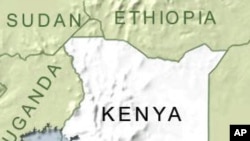The British government said it will stop funding Kenya’s Free Primary Education Program through the country’s ministry of education because of the risk of fraud.
Instead the head of Britain’s Department for International Development, Alistair Fernie announced Tuesday in Nairobi that the UK was exploring ways to channel about $30 million earmarked for 2010-2011 directly to schools.
The United States earlier this year suspended about $7 million in funding to Kenya’s Primary Education Program because of allegations of fraud.
Musau Ndunda, secretary general of the Kenya National Association of Parents said he hopes the British decision will force the Kenyan government to aggressively deal with the issue of corruption within the education ministry.
“I think the suspension of the aid by the British government will go a long way in making the government knuckle up because the people who are involved in the fraud and the mismanagement of the funds are still very much working with the Ministry of Education. And therefore I think time has come for our President of Kenya, His Excellency Moi Kibaki needs to take a quick action to save the lives of 8.8 million children in our country,” he said.
Ndunda said the Kenya National Association of Parents since last year has been pointing out to the government the level of fraud that was going on in the Ministry of Education.
He said unfortunately the government never took any serious action to address those issues.
Ndunda said the Association of Parents welcomes Britain’s announcement that it was exploring ways to channel education funding perhaps directly to the schools.
He said non-governmental organizations have a good record of managing funds and it would be a good move to channel funding for education through them.
“I think that’s a good move because I remember two years ago we had the same problem with the HIV/AIDS funds, and I remember that the same money was taken from the government and given to the NGOs and it’s now working very well in our country. So NGOs have a lot of credibility and they are able to work with the grassroots community,” he said.
The Kenyan Ministry of Education has been on a hot seat since the scandal of missing funds broke last year.
Ndunda said several audits support the allegations of missing funds at the Ministry of Education.
“One of the things that I want to tell you is that our Ministry of Education officials are not open, and they would not want to come out clearly because they know what has happened at the Ministry of Education,” Ndunda said.
He said the Association of Parents carries some weight on issues relating to education, but parents' participation of on issues of governance leaves much to be desired.
“In one way, being a National Association of Parents we represent quite of a big constituent in the country. We have close to 7.8 million parents who have children in school, and we have been able to influence a lot policy chances in the country. But the only problem is that the participation of parents in the issues of governance of education in the country leaves a lot to be desired because parents do not participate in the national policy formulation,” Ndunda said.




